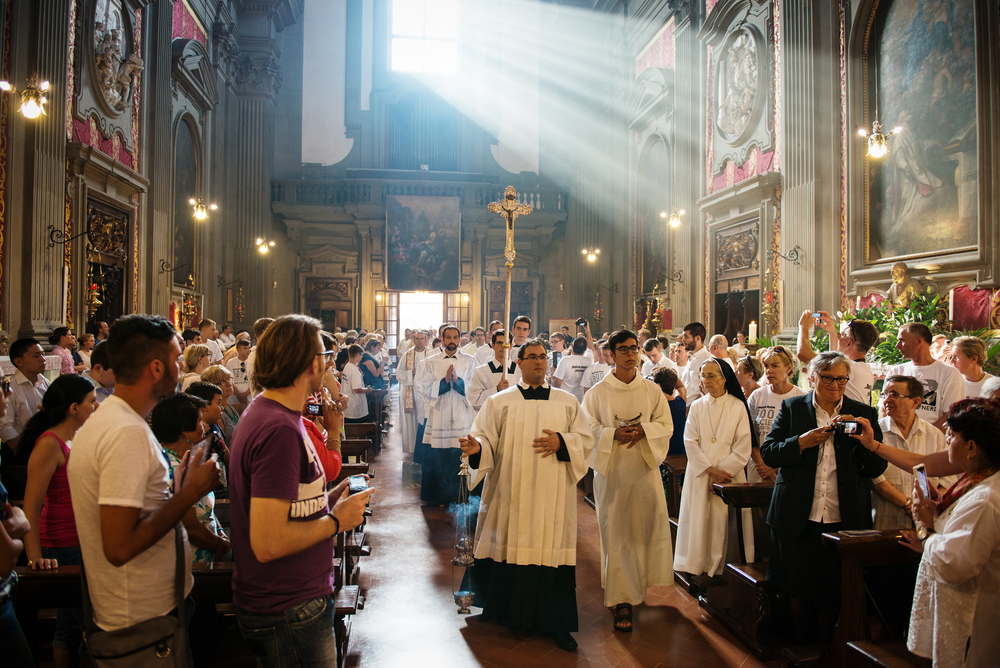G.K. Chesterton once said that a stolen umbrella confirmed for him that the Catholic Church was where he belonged. As he explained, when attending different Christian churches, he often left his umbrella at the back door and collected it after the service. After attending his first Catholic mass, however, he discovered that his umbrella was nowhere to be found. Someone had stolen it. This, he recognized, was a sign: if the Church welcomed even thieves and misfits, then there must be room in it for everyone, himself included.
Chesterton, of course, happened to discover something that has been true throughout the ages: the Catholic Church is indeed composed of a motley crew. It’s a hospital for sinners, after all, and make no mistake—every one of us is a sinner. It’s no surprise, therefore, that the Church should experience turbulence in every age, including our own. Here in the United States, for example, the Church faces formidable challenges: an increasingly polarized culture, a loss of young people from the faith, a pope who sometimes seems at odds with U.S. church leadership, and growing apathy among many congregations, to name but a few. On the other hand, there are many bright spots: a large contingent of unchurched young people starving for truth, parishes thriving in various communities throughout the land, a renewed vigor for evangelization and church doctrine, and a strong brotherhood within many dioceses themselves.
Thus, the drama of the modern Church, as with any institution, consists of adversity and opportunity, struggle and victory, pessimism and optimism. Now, for the first time, a brand new book examines this drama from within the Church itself. In True Confessions: Voices of Faith from a Life in the Church, author Francis X. Maier presents the state of the modern Church through the eyes of U.S. bishops, priests, deacons, sisters, and laypeople alike. In so doing he reveals the authentic concerns and challenges, as well as the sincere confidence and hope, of those who live and breathe the Catholic faith.
One common concern expressed throughout the book is the antipathy toward Christianity expressed by mainstream culture. “What we’ve got now in our country is, at best, a tolerance of religion as a personal hobby for superstitious weak people who cling to their childhood dreams,” notes one bishop. “At worst, more and more, we’re dealing with real hatred, and outright bigotry, toward religious faith.” Sounding a similar note, another bishop points out how society “discourages deep thinking about anything, especially ultimate questions. … Our culture is very good at enabling that disinterest. In the end, though, it leads to a life that doesn’t have any larger meaning.”
Others, however, see a silver lining here. While the animosity toward the Church has undoubtedly weakened the faith of many, such tepid adherence has unfortunately left them without a deep sense of meaning or purpose in their lives. As a result, they’ve found themselves yearning for truth. “I find that many people are hungry for the truth because they get so much equivocation and deceit,” notes one member of the clergy. “Ambiguity confuses,” adds another. “Clarity of teaching is essential. People follow a challenge, not a question mark.” Moreover, others are encouraged by the robust response to this problem from both clergy and laypeople. For example, the Augustine Institute has launched FORMED, a Catholic app hosting hundreds of podcasts, talks, debates, and other resources defending the faith. Likewise, Word on Fire, a Catholic ministry started by Bishop Robert Barron, has racked up millions of YouTube views, mostly from young people clamoring for wisdom. And EWTN, a Catholic TV, radio, and news platform run by lay members of the faith, has also grown an impressive following. “So,” concludes one priest, “I’d argue that a new evangelization is actually underway, despite all obstacles.”
Aside from this, readers will find mixed (though always respectful) thoughts about Pope Francis, who many believe has leveled unjustified criticism at church leadership in the U.S. Here, for instance, is how one prelate puts it: “Yes, he shoots from the hip. Yes, he’s unreasonably negative toward capitalism. And I don’t think his pontificate’s focus on climate and the environment makes much sense, given all the other urgent issues we face. But … I was very impressed with his energy and personal warmth. Francis also seems to be looking for pastorally oriented men as bishops; guys who’ve been engaged in pastoral work. And that’s an appropriate thing to do.” Another writes that “Pope Francis has great love for the poor. His heart is genuine. … But a pope should be the principle of unity in the Church, and instead Francis fosters ambiguity, which feeds division. His distaste for the United States and its bishops is obvious and unwarranted.” Even so, whatever challenges Pope Francis may pose, the bishops themselves tend to agree that their fraternity and esteem for one another is strong. “I respect my brother bishops,” one writes. “They’re nearly all good, faithful men.”
Furthermore, the book also gives priests the chance to give their honest assessment of the state of the Church. Fascinatingly, priests report very high levels of fulfillment. In fact, a full 77% of priests categorize themselves as “flourishing.” As one priest explains, “I feel remarkably fulfilled in my life. … I mean, just to be able to minister to people, being able to love them. Being able to be Christ for them … it’s just such a beautiful life.” Especially interesting is one priest who describes how celibacy enhances not only his ability to be a father to his parish but also his happiness. “Celibacy,” he explains,
is a gift to the Church; it can and should survive. It’s a charism. It’s not doctrinally necessary, but it’s no accident that all of the great Christian missionary movements came out of the Western Church, not the Eastern Church. If I’m married with two or four or six kids, I don’t have the freedom to give all of myself to the Church and her people. It would be profoundly unjust to expect a married man with children to spend the kind of time that I do in and around the parish. Plus, candidly, along with the sacrifice there’s a lot of freedom and happiness in celibacy, especially as priests age.
Of course, priests give voice to numerous other issues as well, including the burdens of priestly life, the role of technology and whether it will accelerate a “materialist” outlook, and what the Church should do to impact culture in the coming decades.
Sisters and laypeople, too, give their input on matters in the Church. Asked, for example, why women’s religious vocations are relatively rare nowadays, one sister says simply that “obedience is not a high value in America.” Given the hyperfocus on individualism and personal expression today, submission to a higher authority does indeed strike many as an obstacle to happiness. Yet as one lay female university professor keenly observes, the lack of obedience to a higher authority in fact causes unhappiness. “When students are fragmented and unhappy,” she says, “they can be riled up to think that by latching onto this or that large cause of justice, it’s somehow going to give their life meaning. But if they don’t deal with the core of the problem, which is that they don’t have intimacy, and they don’t have a commitment to things higher than mere politics, then they don’t live in a way that builds order from the ground up.”
Needless to say, this is but a sampling of the many reflections, fears, hopes, frustrations, and joys conveyed by the hundreds of voices throughout the pages of this unique book. Together, however, they make one thing abundantly clear: the Church today is, as it always has been, a spectacularly diverse group of people from every walk of life. Does it have its challenges? Undoubtedly. But is there reason for hope? Always. The gates of hell, after all, will never prevail against it.

